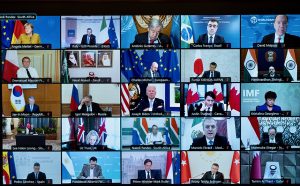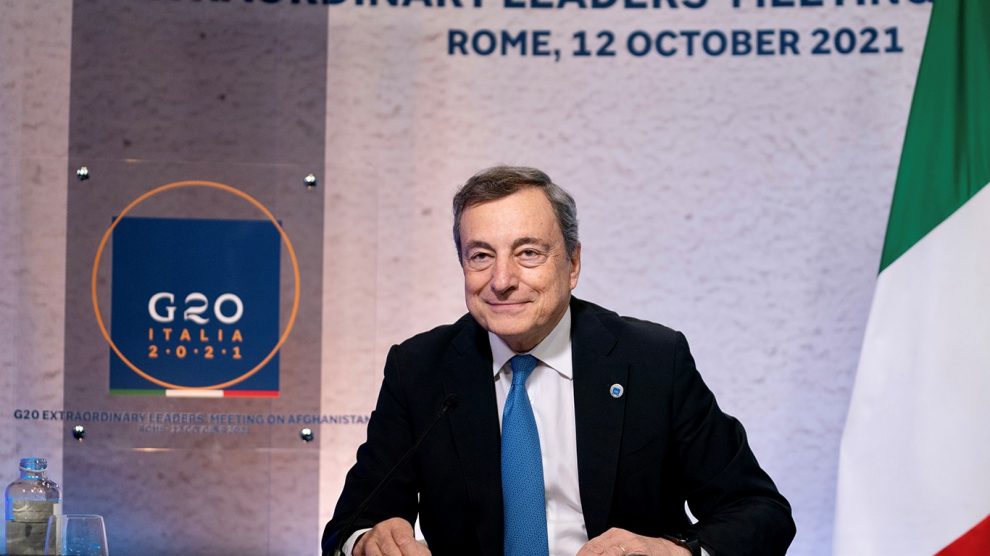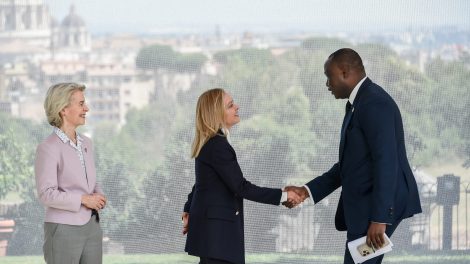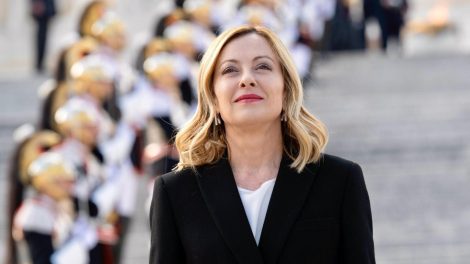The G20 Extraordinary Leaders’ Meeting on Afghanistan came officially to a close with Italy’s Prime Minister Mario Draghi, who had been organising the event since hours after the fall of Kabul, appearing before the press to debrief. Meanwhile, an EU-US joint delegation was speaking with Taliban envoys, face-to-face for the first time, behind closed doors in Qatar.
The meeting in Rome entailed G20 leaders and ministers appearing virtually, along with representatives from several other countries and international institutions. Discussions developed around two main issues, namely humanitarian aid and security, as participants offered their views on how best to address the Afghan predicament.
Outcomes included a broad mandate to the United Nations to coordinate the efforts of participating countries and institutions to address the humanitarian crisis by shoring up the Afghan tattered economy to ensure that humanitarian aid can be delivered, all while avoiding the official recognition of the Taliban.
Mr Draghi also spoke of human rights and international terrorism. He also announced EU and US funding pledges and underscored the urge to maintain a multilateralist approach to the crisis, as has been done via the summit. His remarks are unpacked below.
The UN’s declarations before the summit
UN Secretary-General Antonio Guterres had anticipated the G20 summit by declaring that the country was at a make-or-break moment. Speaking to reporters in New York, he called for “find[ing] ways to inject liquidity into the economy for [it] not to collapse” while respecting international law and principle.
“If we do not act and help Afghans weather this storm, and do it soon, not only they but all the world will pay a heavy price,” continued Mr Guterres.
He also expressed concern regarding the state of Afghan women and girls, most of whom are being barred from working and studying. “I am particularly alarmed to see promises made to Afghan women and girls by the Taliban not being honoured,” he said.
PM Draghi’s debrief
Mr Draghi began by acknowledging the “shared awareness” among participants with regards to the “extreme gravity” of the humanitarian crisis in the making. He also noted how the upcoming winter risked worsening the situation.
“[I was going for] the maximum emphasis on the best agreement possible,” explained the Italian PM, “and [I remarked] great availability to act and a substantial convergence of views on the need to tackle the humanitarian emergency.” The aim, he said, was to reach a “unified position.”
In practice, he continued, the summit resulted in a general mandate to the UN – the “great director of this operation” – to coordinate the countries’ response and even act directly. All actors will work under this “great umbrella,” he added, and the UN will provide a roadmap on how to proceed “rapidly” with international aid.
Mr Draghi identified the need to avoid the economical collapse of Afghanistan and saving “what little is left” of the banking system as a chief urgency, as a complete fall would make humanitarian aid nearly impossible to deliver. Fighting Covid-19 is less of a priority but still an important issue, he added, because it could worsen the overall situation if left unchecked.
The PM spoke of organising aid and relief programmes for migrants. He then moved on to human rights, remarking that the entirety of the summit touched upon the issue of women’s rights, the need to guarantee female education and avert a 20-years backsliding, as seems to be the case now.
Responding to the humanitarian crisis will “inevitably” require keeping communications channels with the Taliban open. “There are no alternatives, but this doesn’t entail a recognition,” stressed Mr Draghi, adding that such recognition will only be given “by the international community when it will decide that progress has been made on human rights, schooling and education of women and so on.”
The next item on the agenda was international terrorism, namely preventing Afghanistan from becoming a safe haven for terrorists yet again. Mr Draghi underscored the “great commitment” of several leaders and their will to coordinate. “The first answer is to communicate, and that has been extremely valid in these years.”
Maintaining Kabul’s international airport open is also a top priority, as it is essential to convey international aid. Likewise, including neighbouring countries is “essential,” as they are at the receiving end of the untraceable Afghan migration – which is set to continue.
Mr Draghi then hailed the event as “the first multilateral response to the Afghan crisis.” If one were to adopt “a long-term perspective,” he added, one “could say that all in all multilateralism is returning; with difficulty but it’s returning as a working scheme of the most important countries in the world.”
Finally, he highlighted his invitation to other world leaders to work together “as much as possible, especially in responding to the humanitarian crisis, as this could at least aid us in overcoming our inevitable differences of views on foreign policy. On this matter, there is no diversity [of opinions].”
The EU and US funding pledge
The EU opened up the meeting by pledging €1 billion to address the impending humanitarian crisis in Afghanistan, AFP reported. Commission President Ursula von der Leyen announced that the money would be used to “avert a major humanitarian and socio-economic collapse.”
€550 million are earmarked for urgent humanitarian needs and will be channelled through international organisations working in the country, as Ms von der Leyen stressed. The remaining sum is destined to neighbouring countries that are taking in Afghans fleeing the Taliban.
By contrast, EU development funds – which have helped to prop up the Afghan economy in the past – remain frozen, along with most of the international aid available to the Afghans before the Taliban took Kabul on August 15. Before that, the country was 75%-dependent on foreign aid.
At the meeting, US President Joe Biden promised to contribute with an additional 300 million.
Who participated, and who didn’t
Mr Guterres represented the UN, while the International Monetary Fund’s Kristalina Georgieva and the World Bank’s David Malpass conveyed their institutions’ positions.
The country leaders who joined in from Northern America were the US’ Joe Biden and Canada’s Justin Trudeau, along with Mexico’s Foreign Secretary Marcelo Ebrard. Southern America was represented by Argentina’s Alberto Fernández, Brazil’s FM Carlos França. FM Naledi Pandor represented South Africa.
On the European side were France’s Emmanuel Macron and Germany’s Angela Merkel, along with Spain’s Pedro Sanchez and the Netherlands’ Mark Rutte. The EU was represented by the President of the Council of Europe, Charles Michel. The UK’s Prime Minister Boris Johnson did not participate, but he sent in Foreign Minister Liz Truss.
Over to Asia, which was widely represented by several leaders: Japan’s Fumio Kishida, Singapore’s Lee Hsien Loong, South Korea’s Jae-in Moon, India’s Narendra Modi, Qatar’s Tamim Al Thani and Turkey’s Recep Tayyip Erdogan. Additionally, Saudi Arabia’s Prince Faisal Al Saud and Indonesian Ambassador to the US Mahendra Siregar participated.
Chinese President Xi Jinping and his Russian counterpart Vladimir Putin did not show up. Beijing’s Foreign Minister Wang Yi stood in for Mr Xi, whereas his Russian colleague Sergey Lavrov could not attend as he was “travelling,” as reported by Tass. His deputy Igor Morgulov represented the Kremlin. Nonetheless, Mr Draghi said his previous conversations with the two leaders have been “fruitful, long and very cordial.”
Representatives from Russia and China are scheduled to convene in Moscow in a week’s time to discuss the Afghan situation. That meeting will also feature Pakistan, Iran and India. The Kremlin’s envoy to Afghanistan Zamir Kabulov confirmed that a smaller meeting between Russia, China, Pakistan and the US will meet before the talks in Moscow.





